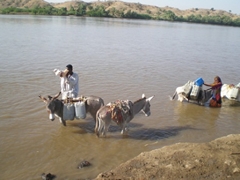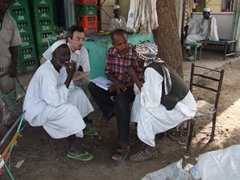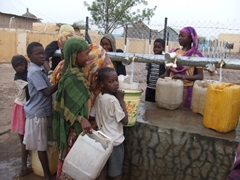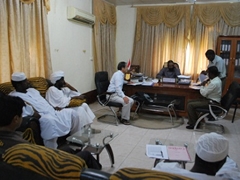- Home
- Technical Cooperation Projects
- Index of Countries
- Africa
- Sudan
- Capacity Development Project for Provision of the Services for Basic Human Needs in Kassala
- Project News
- Impact Analysis Survey of the Pilot Project
Project News
2012-10-25
Impact Analysis Survey of the Pilot Project
–Has the well rehabilitation project improved the quality of life for residents?–
 Donkey water sellers are getting river water in plastic containers. Some people drink the brown water of the river.
Donkey water sellers are getting river water in plastic containers. Some people drink the brown water of the river.
The Counterparts (C/P)and JICATeam conducted an impact analysis survey of the Pilot Project, the well rehabilitation project at Wad El Helew. We interviewed ninety five residents on August 27 and September 2, 2012. The Capacity Development Project for the Provision of Services for Basic Human Needs in Kassala, the Republic of Sudan (K-TOP) includes "pilot activities" to provide tangible benefits of the peace to local communities. One of these pilot activities is the well rehabilitation work at Wad El Helew, a community with around 15,000 residents. The C/P, State Water Corporation (SWC), conducted the well rehabilitation work with the technical and financial support from JICA, and began supplying well water on March 21, 2012.
Before March 2012, all residents of Wad El Helew drank river water. Since the well rehabilitation completed in March, a portion of the residents (between 2,000 and 3,000 people) have begun drinking the well water. The C/P and JICA Team conducted an impact analysis survey to determine how the completion of the well rehabilitation has affected the amount of time the residents use for getting water, how much they spend on water, and how often they go to the hospital. In other words, has the well rehabilitation project improved the quality of life for the final beneficiaries?
 Mr. Mohamed Ali (M&E staff in Directorate of Planning and Development (DPD), second from the right) and Mr. Hagiwara (JICA Expert, second from the left) interview residents at Wad El Helew. The SWC and DPD M&E Section cooperated to conduct this survey.
Mr. Mohamed Ali (M&E staff in Directorate of Planning and Development (DPD), second from the right) and Mr. Hagiwara (JICA Expert, second from the left) interview residents at Wad El Helew. The SWC and DPD M&E Section cooperated to conduct this survey.
First of all, the C/P and JICA Team selected 62 residents who drink the well water, and on the other hand, 33 people who continue to drink river water. The survey found that those who drink the well water spend 13 minutes on average for a round trip to get water, compared to 70 minutes previously, thereby having achieved a reduction of 57 minutes. The average cost spent on water is 68 SDG a month, compared to 137 SDG prior to March. Hospital visits decreased from an average of 3.2 times per month to 2.1 times. Those who drink the river water reported no changes in time spent getting water, monthly water expenses or the frequency of hospital visits.
The differences observed among those residents who began drinking the well water from March 2012 can be considered as an effect of the Pilot Project. The JICA Team conducted a paired t-test, used in statistics, to examine whether these differences could happen accidentally in daily life (e.g. children become feverish, more often go to the hospital, and need more water for sustaining fever), or these differences rarely occur in daily life. The result of the paired t-test was that the differences in water carrying time, monthly water expenses and frequency of hospital visits are "statistically significant." For example, the reduction in water carrying time, 57 minutes, is represented as t=14.74, p<0.001. The probability of a 57 minute reduction (less than 0.1%) would be extremely rare. The result shows that the well rehabilitation work is effective in substantially reducing the water carrying time. The result is applicable to some extent to the all residents of Wad El Helew.
The C/P and JICA Team presented the survey results to the Wad El Helew Commissioner, Deputy Commissioner, and Water Committee members. The Commissioner pointed out an additional benefit, "Every rainy season, three boys on average used to be drowned in the river swollen with rain, but no children had died this year."It seems that the well rehabilitation project has improved the quality of life for residents.
 Many children come to the well to get water. The water carrying time has been substantially reduced.
Many children come to the well to get water. The water carrying time has been substantially reduced.
 The C/P and JICA Team (Mr. Kuroda, JICA Expert, left of the center) discuss management of the rehabilitated wells with the Wad El Helew Commissioner, Deputy Commissioner and Water Committee members.
The C/P and JICA Team (Mr. Kuroda, JICA Expert, left of the center) discuss management of the rehabilitated wells with the Wad El Helew Commissioner, Deputy Commissioner and Water Committee members.
(Reported by Mr. Yasuyuki Kuroda, JICA Expert on Urban Water Management / Financial Management)
- About JICA
- News & Features
- Countries & Regions
- Our Work
- Thematic Issues
- Types of Assistance
- Partnerships with Other Development Partners
- Climate Change / Environmental and Social Considerations
- Evaluations
- Compliance and Anti-corruption
- Science and Technology Cooperation on Global Issues
- Research
- JICA Development Studies Program / JICA Chair
- Support for the Acceptance of Foreign HRs / Multicultural and Inclusive Community
- Publications
- Investor Relations
